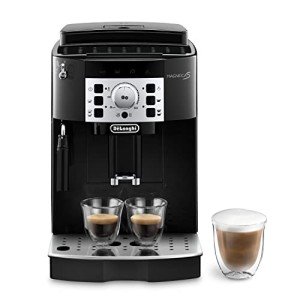This Is The Ugly Reality About Bean To Cup Espresso Coffee Machine
Bean To Cup Espresso Coffee Machine: The Ultimate Guide
Recently, the coffee culture has experienced a substantial transformation, with the increase of home developing gadgets providing convenience and quality similar to café offerings. Among these gadgets, the Bean to Cup Espresso Coffee Machine stands out as a favorite among coffee lovers and casual drinkers alike. This detailed guide explores what these machines are, how they operate, the benefits they use, and aspects to consider when choosing the right one.
What is a Bean to Cup Espresso Coffee Machine?
A Bean to Cup Espresso Coffee Machine is an innovative coffee developing device that grinds coffee beans fresh for each cup, automating the entire espresso-making process. These machines typically feature built-in mills, incorporated milk frothers, and accurate brewing technology, enabling users to create high-quality espressos, lattes, cappuccinos, and more, all from the convenience of their homes. The convenience, coupled with the abundant and robust tastes produced, has actually made these machines progressively popular.
How Does It Work?
The basic operation of a Bean to Cup Espresso Coffee Machine can be broken down into a number of crucial steps:
Bean Grinding
- The machine grinds whole coffee beans right away before developing, ensuring maximum freshness and taste retention.
Brewing
- Ground coffee is loaded into a filter, and warm water is forced through the coffee premises at high pressure, which is vital for producing espresso.
Frothing (Optional)
- Many models include a steam wand or milk frother for preparing frothed milk for lattes and cappuccinos.
Serving
- The last stage involves giving the brewed coffee into a cup, typically with programmable functions for modification.
Benefits of Bean to Cup Espresso Machines
Investing in a Bean to Cup Espresso Coffee Machine uses numerous advantages, adding to its growing appeal.
Advantage
Description
Convenience
One-touch operation decreases the time and effort required to prepare coffee.
Quality
Freshly ground beans cause a richer, more flavorful beverage compared to pre-ground alternatives.
Personalization
Users can change settings to suit personal choices, including grind size, coffee strength, and milk froth levels.
Affordable
Although the initial financial investment might be high, savings on coffee purchases from cafés can be considerable with time.
Flexibility
The ability to brew different coffee types, from espresso to cappuccino, broadens the machine's appeal.
Secret Features to Look For
When picking a Bean to Cup Espresso Coffee Machine, different features can affect the purchase decision. Below are necessary factors to consider:
Grinder Type
- Burr mills are chosen over blade mills for their constant grind size.
Developing Pressure
- Look for machines that offer at least 15 bars of pressure for optimal espresso extraction.
Milk Frother
- Choose in between manual steam wands or automatic milk frothers based on preferences for milk texture and foam.
Interface
- An user-friendly control panel with programmable settings improves the general experience.
Size and Design
- Think about the countertop space readily available and pick a design that complements your kitchen area visual appeals.
Upkeep Options
- Some machines use automatic cleansing cycles, which can conserve time and effort in maintenance.
Popular Bean to Cup Espresso Machines
Selecting a machine that fits one's requirements can be tough. Below is a list of popular models, known for their dependability and performance.
Model
Key Features
Price Range
De'Longhi Magnifica ESAM3300
Adjustable coffee strength, compact style
₤ 550 – ₤ 700
Breville Barista Touch
Touchscreen controls, integrated conical burr mill
₤ 800 – ₤ 1,150
Saeco PicoBaristo
Automatic milk frother, 12 coffee specialties
₤ 900 – ₤ 1,300
Jura E8
Pulse Extraction Process, Alexa Compatible
₤ 1,800 – ₤ 2,500
Gaggia Anima
Easy to clean, programmable settings
₤ 500 – ₤ 800
Upkeep Tips
Keeping a Bean to Cup Espresso Coffee Machine in great condition is essential for making sure longevity and optimum performance. Here are some upkeep pointers:
- Regular Cleaning: Clean the machine's parts frequently, consisting of the drip tray, coffee grounds container, and water reservoir.
- Descaling: Perform descaling every couple of months based on water solidity and use to avoid mineral buildup.
- Change Water Filter: If the machine has a water filtration system, change the filter as recommended.
- Check Seals and Gaskets: Check for wear and tear to prevent leaks and make sure proper pressure during brewing.
FAQs
1. Retro Bean To Cup Coffee Machine to Cup Espresso Machines simple to use?Yes, most models are created for user benefit with easy control panels and one-touch operation. 2. Can I utilize pre-ground coffee in these machines?While some machines allow for making use of pre-ground coffee, the primary advantage depends on using whole beans for fresh grinding. 3. How frequently need to I clean my Bean to Cup machine?Regular upkeep is crucial; daily cleaning of removable parts and descaling every 2-3 months are normally recommended. 4. What is the typical
life expectancy of a Bean to Cup Espresso Coffee Machine?With correct upkeep, these machines can last anywhere from 5 to 15 years based on use quality
**. 5. Are these machines worth the investment?Though they can be expensive, the benefit, quality coffee production, and long-term cost savings make them a worthwhile financial investment for lots of coffee lovers. Buying a Bean to Cup
Espresso Coffee Machine can significantly boost the home
coffee experience. By offering newly brewed, Retro Bean To Cup Coffee Machine -quality coffee, these machines cater to the growing need for café-style drinks in the comfort of one's kitchen area. With Retro Bean To Cup Coffee Machine on the market, understanding functions and personal preferences will help in selecting the ideal machine to fit any coffee fan's needs.  **
**